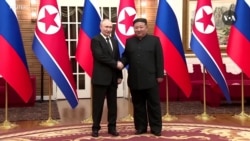North Korea and Russia sign a mutual defense treaty, surprising many observers.
Welcome to VOA Asia Weekly. I'm Chris Casquejo in Washington. That story is just ahead, but first, making headlines:
Taiwan President William Lai said on Wednesday that only military strength can maintain peace with China, which has stepped up military pressure against the self-ruled island since his inauguration as president.
"Taiwan's people love peace and helping others. However, peace must rely on strength. This means avoiding war by preparing for it, aiming to achieve peace.”
Lai's message came moments after the U.S. approved a $360 million sale of drones and missiles to Taiwan.
The South Korean government issued a return-to-work order to doctors participating in a one-day walkout on Tuesday. More doctors and medical professors have joined the months-long strike against the government’s plan to sharply increase medical school admissions. Around 4% of the country’s private clinics had informed the government of plans to close on Tuesday.
A group of U.S. lawmakers met with the Dalai Lama in the northern Indian town of Dharamshala on Wednesday. U.S. officials said they reaffirmed American support for Tibet’s right to self-determination. However, Beijing's spokesperson urged the U.S. to “stop sending the wrong signal to the world.”
"Tibetan affairs are China’s internal affairs and do not allow for interference by any external forces. We urge the United States to fully recognize the importance recognize the importance and sensitivity of Tibet-related issues."
Chinese electric vehicle manufacturer Xpeng (X-Fang) tested its latest drone car, the X2. The car can fly for 25 minutes at a maximum speed of 80 miles per hour, 130 kilometers per hour. This demonstration marks another milestone in the development of flying car technology in China.
Thailand's Senate approved a bill to legalize same-sex marriages in the country, making it the first country in Southeast Asia to recognize same-sex couples. The bill is currently awaiting royal approval, followed by publication in the Government Gazette. It will become effective 120 days after that.
Russian President Vladimir Putin and North Korean leader Kim Jong Un upgraded their countries’ relationship during a meeting in Pyongyang on Wednesday. As VOA’s Bill Gallo reports from Seoul, South Korea, they signed a treaty with a mutual defense clause, criticized by the U.S. and its allies as a threat to global peace.
Not many countries give Vladimir Putin this kind of welcome.
A festive mood in Kim Il Sung Square, as the Russian president visited North Korea for the first time in 24 years.
Ties have strengthened after North Korea supported Russia’s invasion of Ukraine – a war that has made Putin a pariah in many other countries.
Two isolated leaders looking for friends. They met one-on-one for two hours.
Afterwards, the two men signed a treaty pledging to come to each other’s defense if attacked.
"The comprehensive partnership agreement signed today includes, among other, mutual assistance in the event of aggression against one of the parties to this agreement."
"Our two countries' relations have been elevated to a new, high level of alliance, laying the legal groundwork for the grand ideas of leadership of the two countries.
The signing of the mutual defense treaty surprised many observers, who view the Putin-Kim relationship as a marriage of convenience.
“Kim Jong Un has been able to extract more concessions than we thought he would be able to from his support for Russia’s invasion of Ukraine.”
But while Putin and Kim may be trying to reanimate Soviet-era relations, not all analysts are convinced that will be easy – noting that the relationship has long seen ups and downs.
“Clearly it’s an important development, but I think we will need to see this relationship continue on a strong footing for a number of years before we can say there has been a definite change in the relationship.”
For now, both men are portraying friendly relations.
Before leaving Pyongyang, Putin gave Kim a luxury Russian limousine, even taking him for a drive around palace grounds.
An attempt to present a unified stance as each man confronts the West.
Bill Gallo, VOA News, Seoul, South Korea.
Finally, to New York City, where Asians make up more than 14% of the population.
There are actually several so-called Chinatowns in New York City. An unofficial Chinatown in Long Island City is considered by those living there a younger and hipper Chinatown.
To watch more “Chinatown: Past, Present, and Future” stories, visit voanews.com/chinatowns
Thanks for watching VOA Asia Weekly.












